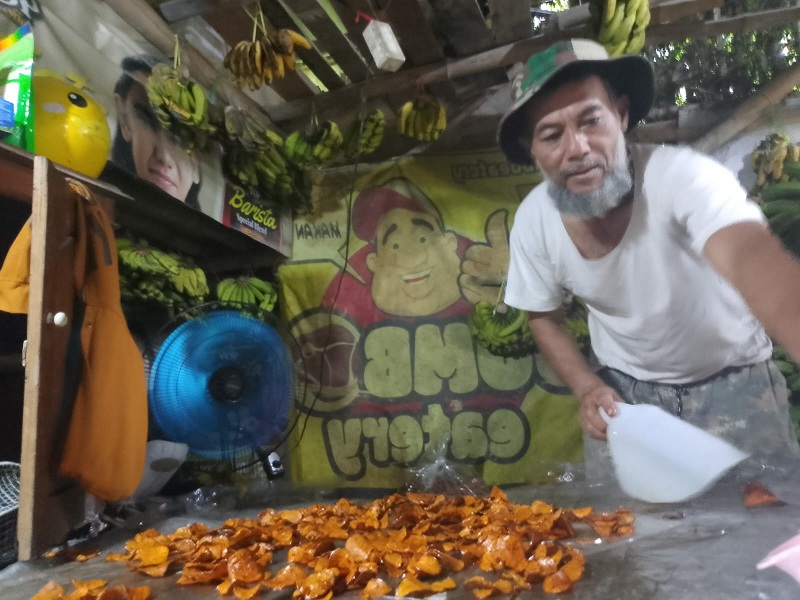The cassava and banana chip business in Jelegong Village, Kutawaringin District, Bandung Regency, continues to face serious development challenges.
Although these snacks are popular for their savory and crispy taste, limitations in halal certification and packaging standards prevent businesses from consistently penetrating the modern market.
A 50-year-old chip craftsman from the village mentioned that his products have successfully been marketed to other regions.
“There have been requests from Jakarta and several cities in Central Java. They were even shipped to Lampung by land,” he said.
However, he acknowledged that not all orders go smoothly. Several times, orders were rejected because buyers requested guarantees of halal certification and retail-standard packaging.
“They often say the product is good and tastes delicious, but without a halal certificate and official packaging, the goods get rejected,” he explained.
This frequently hinders his business, even though market opportunities are actually wide open.
“It’s a shame, because we had prepared a large production batch, but it was ultimately returned because the requirements weren’t met,” he added.
Besides certification issues, limited capital is also a major problem. The craftsman admitted he cannot afford equipment like modern sealing machines and vacuum packaging that could extend the product’s shelf life.
“My capital is only enough for daily production. When supermarkets or large buyers typically pay later, it becomes even more difficult for a small business like mine,” he clarified.
He emphasized that the need for halal certification is becoming increasingly urgent.
“Now people are more careful; they want products that are clearly halal with neat packaging. If we just use regular plastic, it appears less convincing,” he stated.
Nevertheless, chips from the village still hold a special appeal for local consumers. Their savory taste and use of fresh ingredients keep many customers loyal.
“These homemade chips are crispier and more natural; the taste is just as good as those sold in big stores,” said a customer from Kutawaringin.
The local government has reportedly provided several MSME training sessions. However, according to the craftsman, this assistance hasn’t addressed the core needs of the artisans.
“We don’t just need theory; we also need help with certification, equipment, and additional capital to truly develop,” he expressed.
Despite facing many obstacles, the craftsman remains optimistic. He sees demand from outside West Java as a significant opportunity to grow his chip business.
“Once we have halal certification and standard packaging, I’m confident that chips from here could become a signature souvenir of Bandung Regency,” he said.
He hopes for tangible support from both the government and private sector to help elevate the chip business.
“If we receive equipment assistance and certification support, we can improve quality and reach a broader market. Small businesses like this shouldn’t stall just due to lack of support,” he concluded.
Jelegong Village
Jelegong Village is a small settlement located in Bandung, West Java, Indonesia. Historically, it was a quiet rural area, but it gained notoriety in the early 2000s as the site of a large, informal landfill that served the city of Bandung. This landfill brought significant environmental and social challenges to the local community.
Kutawaringin District
Kutawaringin District is a regency (kabupaten) located in West Java, Indonesia. Historically, its name is believed to derive from the words “kuta” (fort) and “waringin” (banyan tree), suggesting a significant settlement in the past. Today, it is an administrative region known for its agricultural activity and scenic landscapes.
Bandung Regency
Bandung Regency is an administrative region in West Java, Indonesia, surrounding the city of Bandung. Historically, it was part of the Sunda Kingdom and later became a major center for plantation agriculture during the Dutch colonial era. Today, it is renowned for its scenic highland landscapes, volcanic attractions like Tangkuban Perahu, and thriving tea plantations.
Jakarta
Jakarta is the capital and largest city of Indonesia, located on the northwest coast of Java. Historically known as Batavia during the Dutch colonial era, it served as the capital of the Dutch East Indies and became the center for the spice trade. Today, it is a bustling, sprawling metropolis that serves as the country’s political and economic hub.
Central Java
Central Java is a province of Indonesia located in the middle of the island of Java, historically the center of powerful Hindu-Buddhist empires and the birthplace of essential Javanese culture. It is home to some of Indonesia’s most significant cultural and religious monuments, most notably the 9th-century Borobudur, the world’s largest Buddhist temple. The region’s history also includes the later Mataram Sultanates, which established the city of Yogyakarta as a Javanese cultural capital.
Lampung
Lampung is a province located on the southern tip of Sumatra, Indonesia, historically known as an important part of the Srivijaya maritime empire. Its culture is notably influenced by this history, as well as by Javanese migration, and is famous for its traditional woven cloth, “tapís.” Today, it is a significant region for agriculture and is known for its natural attractions, including the Krakatoa volcano.
West Java
West Java is an Indonesian province on the island of Java, historically home to the Sundanese people and the powerful Hindu Kingdom of Pajajaran. The region is renowned for its vibrant capital, Bandung, and its stunning natural landscapes, which include active volcanoes, tea plantations, and wildlife reserves. Culturally, it is famous for its distinctive music, dance, and traditional art forms like *wayang golek* (wooden puppet theater).
Bandung Regency
Bandung Regency is a region in West Java, Indonesia, surrounding the city of Bandung. Historically, it was part of the Sunda Kingdom and later became a major center for plantation agriculture during the Dutch colonial era. Today, it is renowned for its lush highland scenery, volcanic landscapes, and thriving agricultural and tourism industries.






